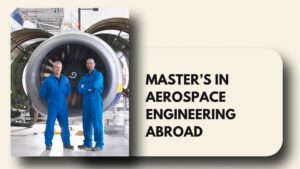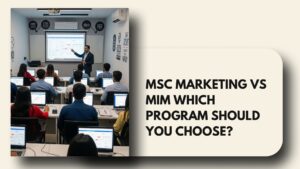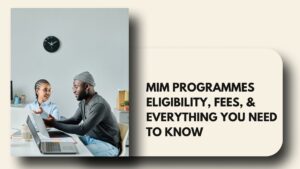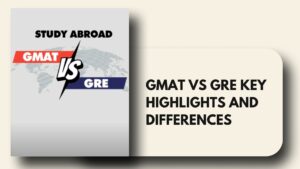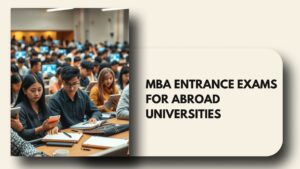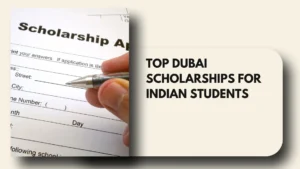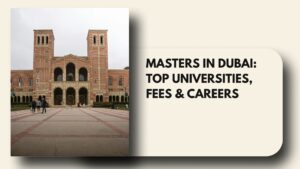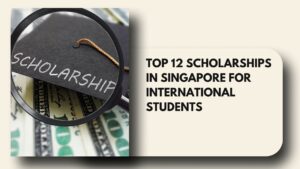- Financial proof is one of the strongest pillars of approval: most countries require 3-6 months of stable bank statements and affidavits of support to validate your eligibility.
- Your transcripts are the foundation of your application: missing seals or attestations can lead to instant rejection by universities.
- Health and insurance documents are time-sensitive: medical fitness certificates and vaccination records are mandatory in many countries and should be prepared early to avoid delays.
Applying to study abroad is a mix of dreams and deadlines. Every document you submit tells part of your story and shows visa officers that you are prepared for the journey ahead. One missing file can hold back an admission or delay your visa, so having a solid checklist is non-negotiable.
In this guide, we’ll break down all the essential documents you need for a successful study abroad application.
- Major Documents You’ll Need for Any Study Abroad Application
- Academic Credentials: Essential Documents and Verification Requirements
- English Language Proficiency Tests
- Graduate Aptitude Assessments
- Critical Supporting Documents for Study Abroad Applications
- Letters of Recommendation (LOR)
- Curriculum Vitae (CV)
- Common Mistakes and How to Avoid Them: Authentication and Verification Errors
- Key Takeaways by AdmitX
- Frequently Asked Questions (FAQs)

Major Documents You’ll Need for Any Study Abroad Application
Before getting into the fine details, let’s understand the basic criteria for studying abroad. Almost every university and embassy will ask you to present some combination of the following:
Academic Credentials and Transcripts
| Document | Description |
|---|---|
| 10th Standard Mark Sheet | Board examination certificate demonstrating foundational academic competency with official seal and verification |
| 12th Standard Mark Sheet | Senior secondary examination results establishing undergraduate program eligibility with board authentication |
| Bachelor's Degree Transcripts | Comprehensive semester-wise academic record including course details, credit hours, and grading scale with university registrar seal |
| Master's Degree Transcripts | Detailed postgraduate academic performance record with course-wise grades and institutional authentication |
| Consolidated Mark Sheets | Comprehensive academic summary document consolidating multi-year performance when specifically required by institutions |
| Degree Certificates | Official degree conferment documents with university seal proving successful program completion |
| Certified Academic Translations | Professionally translated documents by certified translators when original credentials are in regional languages |
English Language Proficiency Tests
| Test Document | Assessment Purpose |
|---|---|
| IELTS | English language proficiency evaluation across listening, reading, writing, and speaking modules |
| TOEFL | Academic English competency assessment through internet-based testing format |
| PTE | Computer-based English proficiency examination with integrated skill assessment |
| Duolingo | Online adaptive English proficiency assessment with speaking and writing components |
Graduate Aptitude Assessments
| Test Document | Assessment Purpose |
|---|---|
| GMAT | Business school aptitude evaluation covering analytical, verbal, quantitative, and reasoning skills |
| GRE | Graduate-level analytical writing, verbal reasoning, and quantitative reasoning assessment |
| SAT | Undergraduate college readiness examination measuring critical reading and mathematical reasoning |
| ACT | Comprehensive undergraduate assessment covering English, mathematics, reading, and science reasoning |
Critical Supporting Documents for Successful Applications
| Document | Professional Purpose |
|---|---|
| Statement of Purpose (SOP) | Personalized academic and career narrative demonstrating program alignment, research interests, and professional objectives |
| Letters of Recommendation (LOR) | Third-party professional endorsements providing credible assessment of academic capabilities, research potential, and character |
| Curriculum Vitae (CV) | Comprehensive professional profile highlighting educational achievements, research experience, publications, and relevant accomplishments |
| Bonafide Certificate | Official institutional verification of current enrollment status or academic standing from educational institution |
| Medium of Instruction Certificate | University-issued document confirming degree program was conducted entirely in English language |
| Academic Grading Scale Certificate | Institutional document explaining grading methodology, grade point calculations, and academic performance standards |
| Professional Work Experience Letter | Employer-issued document detailing job responsibilities, duration of employment, and professional performance evaluation |
| Internship Completion Certificate | Official verification of internship participation including duration, responsibilities, and performance assessment |
| Research Papers and Publications | Academic contributions demonstrating research capabilities, analytical thinking, and scholarly potential |
| Academic Backlog Certificate | Official explanation for any failed subjects, retaken examinations, or academic interruptions with institutional clarification |
| Additional Language Proficiency Certificates | Supplementary language credentials for multilingual program requirements or competitive advantage |
| Professional Industry Certifications | Recognized technical qualifications and industry-standard certifications enhancing academic profile credibility |
Academic Credentials: Essential Documents and Verification Requirements
If your application were a building, your transcripts and certificates would be the foundation. Universities and visa officers rely on them to judge your consistency, course rigor, and whether you meet eligibility standards.
Secondary Education Documentation
Your 12th standard results establish foundational academic credibility and subject prerequisites for undergraduate programs.
Requirements:
- Original mark sheets with official board seals (CBSE, ICSE, State Boards)
- Complete subject-wise breakdown showing percentage or CGPA
- Passing certificates confirming successful completion
- Migration certificates if you changed boards during your education
All documents must be properly attested by the issuing board
Undergraduate Academic Records
Bachelor’s degree transcripts provide comprehensive evidence of your undergraduate academic performance, crucial for graduate program applications.
Requirements:
- Semester-wise or annual mark sheets showing detailed course grades
- Consolidated mark sheets summarizing overall academic performance
- Original degree certificate or provisional certificate for final-year students
- University registrar signatures and official institutional seals
- Transcripts submitted in sealed envelopes when specifically required by universities
- Course catalog or syllabus copy if requested for credit evaluation
Postgraduate Academic Records
Master’s degree transcripts showcase advanced academic capabilities and specialization depth, particularly vital for doctoral program applications.
Requirements:
- Complete semester-wise transcripts with detailed course-wise performance
- Final degree certificate indicating conferment date and classification
- Research project details, thesis grades, and supervisor attestations for PhD candidates
- Official grading scale explanation from your university
- Controller of examinations signature and university authentication
- Academic honors, distinctions, or probation status clearly indicated
Assess your academic eligibility effortlessly using our precise CGPA Calculator, helping you target the right programs with confidence.
English Language Proficiency Tests
Once you have sorted your transcripts, it’s important to focus on English language testing. Below, you’ll find clear details on how the IELTS, TOEFL, PTE, and Duolingo exams are structured, along with the score requirements.
IELTS (International English Language Testing System)
- Structure: Four modules—Listening (30 mins), Reading (60 mins), Writing (60 mins), and Speaking (10–15 mins interview).
- Listening: 40 questions, four sections; common scenarios and academic contexts.
- Reading: 40 questions from three academic texts (for Academic version).
- Writing: Task 1 (visual description, 150 words); Task 2 (argument/essay, 250 words).
- Speaking: Personal and abstract questions, a short talk, followed by discussion.
- Listening: 40 questions, four sections; common scenarios and academic contexts.
- Scoring:
- Each module is marked from 0–9 in steps of 0.5.
- Typical requirements:
- Overall: 6.5–7.0 for undergraduate; 7.0–7.5 for top/graduate programs.
- Minimum per section: Usually 6.0 (some elite programs require 6.5–7.0 per section).
- Overall: 6.5–7.0 for undergraduate; 7.0–7.5 for top/graduate programs.
- Each module is marked from 0–9 in steps of 0.5.
Boost your test prep game! Join our IELTS Bootcamp for targeted strategies and practice.
TOEFL (Test of English as a Foreign Language)
- Structure: Four sections—Reading (35 mins, 20 questions), Listening (36 mins, 28 questions), Speaking (16 mins, 4 tasks), Writing (29 mins, 2 tasks).
- Reading: Academic passages with detail, inference, and vocabulary questions.
- Listening: Lectures and campus conversations; answer questions about main ideas, details, inferences.
- Speaking: Tasks based on personal experience and summary of reading/listening.
- Writing: Integrated and independent essay tasks.
- Scoring:
- Each section: 0–30 points (total: 0–120).
- Typical requirements:
- Overall: 80–100+ (top programs often want 110–120)
- Minimum per section: Usually 18–22 in each section.
- Scores valid for 2 years.
Duolingo English Test
- Structure: Adaptive, computer-based test with:
- Sections: Reading, Listening, Speaking, Writing (all integrated via adaptive modules).
- Includes a graded online adaptive test and a video interview/writing sample (sent to institutions).
- Sections: Reading, Listening, Speaking, Writing (all integrated via adaptive modules).
- Scoring:
- Total score 10–160 (increments of 5).
- Typical requirements:
- Overall: 110–120 for most universities; highly selective programs may require 120–130.
- Minimum per section: No fixed university minimum, but balanced performance in all skills is recommended.
- Overall: 110–120 for most universities; highly selective programs may require 120–130.
- Scores valid for 2 years.
- Total score 10–160 (increments of 5).
Explore our curated collection of resources for study abroad to access practical tools and guides that simplify every step of your journey.
PTE Academic (Pearson Test of English Academic)
- Structure: Three main parts—Speaking & Writing (54–67 mins), Reading (29–30 mins), Listening (30–43 mins).
- Tasks include: Reading aloud, essay writing, summarizing text, interpreting data/images, and answering short questions.
- Fully computer-based and AI-scored for fairness.
- Tasks include: Reading aloud, essay writing, summarizing text, interpreting data/images, and answering short questions.
- Scoring:
- Total score 10–90 (increments of 1).
- Typical requirements:
- Overall: 58–65 (some top programs require 68+)
- Minimum per skill: Usually 50–55 each (varied by specific universities).
- Overall: 58–65 (some top programs require 68+)
- Total score 10–90 (increments of 1).
- Scores valid for 2 years.
Graduate Aptitude Assessments
Graduate admissions require demonstration of advanced academic aptitude beyond language proficiency. Standardized tests such as the GRE and GMAT serve as crucial indicators of analytical, quantitative, and written communication skills.
This section outlines how these exams are structured, how scores are reported, and what universities typically look for in 2026.
Duolingo English Test
- Duration: Approx. 3 hours 7 minutes (including break)
- Sections: Analytical Writing, Integrated Reasoning, Quantitative, Verbal
- Scoring:
- Total score ranges from 200 to 800
- Sections scored from 0 to 60
- Score Requirements:
- Top business schools commonly expect a total GMAT score of 700 or higher
Graduate Record Examination (GRE):
- Duration: Approx. 1 hour 58 minutes (latest official format)
- Sections: Analytical Writing, Verbal Reasoning, Quantitative Reasoning
- Scoring:
- Verbal & Quantitative: each from 130 to 170
- Analytical Writing: scored 0 to 6
- Total score range: 260 to 340
- Score Requirements:
- Competitive programs usually require a combined Verbal + Quantitative score of 320+
- Analytical Writing scores of 4.0 or higher are generally preferred
Scholastic Aptitude Test (SAT):
- Duration: Approx. 2 hours 14 minutes (digital SAT)
- Sections: Reading & Writing, Math
- Scoring:
- Composite total score out of 1600 (800 per section)
- Score Requirements:
- Top-tier universities require scores of 1400+
- Many universities accept scores in the 1100–1350 range
Explore more country-specific requirements in our resources library, carefully curated and documented by our study abroad experts.
Critical Supporting Documents for Study Abroad Applications
The journey to study abroad at esteemed institutions calls for more than impressive grades and test scores. Universities are eager to understand the individual behind the numbers. Carefully prepared supporting documents, including the Statement of Purpose, Letters of Recommendation, and Curriculum Vitae, provide admissions committees valuable insights into your motivation, skills, and suitability.
Statement of Purpose (SOP)
The SOP is where you share your “why”—why you want this degree, why this field, and why this university. It’s your chance to put your academic path and goals into context, letting the admissions team see the logic, drive, and personality behind your application. A strong SOP can set you apart by connecting your past experiences to your future ambitions.
Key Components
- Personal Motivation and Clarity: Start with a clear introduction that communicates your inspiration and long-term vision.
- Academic and Professional Journey: Describe significant coursework, projects, or experiences that built your expertise.
- Program Fit: Show why this program’s structure, curriculum, or faculty will help you reach your specific goals
- Career Goals: Make the link between your studies and your intended career path explicit.
- Evidence of Growth: Share challenges overcome or lessons learned that shaped your outlook.
Important Factors to Consider
- Avoid vague statements or copying generic templates.
- Customize your SOP for each university and do in-depth research about the degree and institutions.
- Proofread for grammar and flow; ask mentors for feedback.
- Aim for authenticity and don’t oversell or downplay your achievements.
Want to perfect your narrative? Get expert help with our Free SOP Review service to make your statement shine.
Letters of Recommendation (LOR)
LORs are professional testimonials that provide an external lens. They allow someone who’s worked with you closely to endorse your readiness and potential.
Strong LORs not only describe your accomplishments but also explain your work ethic, character, and impact on others.
Key Components
- Referee Selection: Choose recommenders (professors, supervisors, mentors) who have directly evaluated your academic or professional contributions.
- Specific Examples: The best LORs cite concrete cases, projects handled, skills demonstrated, problems solved.
- Alignment: Letters should emphasize strengths that are relevant to your chosen program.
- Professional Presentation: Must be on institution/organization letterhead, dated, signed, and submitted confidentially as per university guidelines.
Important Factors to Consider
- Avoid asking for LORs from people unfamiliar with your work.
- Communicate your goals to your referees so their letter supports your narrative.
- Be mindful of timelines and give your recommenders sufficient time and info.
- Confirm university-specific requirements for reference formats and submission procedures.
Curriculum Vitae (CV)
Your CV serves as a strategic showcase of your academic and professional journey, thoughtfully designed to highlight how your experiences and accomplishments meet the expectations and standards of your target universities.
Key Components
- Educational Background: All academic credentials with dates, majors, and honors.
- Experience: Internships, jobs, research, or volunteering, especially those related to your field.
- Skills and Certifications: Both technical and soft skills; relevant languages and courses.
- Publications/Projects: For research-focused programs, list papers, posters, or major presentations.
- Honors and Activities: Awards, scholarships, extracurricular and leadership roles.
Important Factors to Consider
- Avoid unnecessary details or unrelated experiences—keep each line relevant.
- Use a clear order and formatting; prioritize recent and significant achievements first.
- Quantify results where possible (“published 2 articles,” “managed a team of 5”).
- Include links to portfolios or profiles (LinkedIn, GitHub) if appropriate.
Proofread for accuracy and consistency before submission.
Perfect your professional narrative with our expert CV Review service, designed to make your study abroad application truly stand out.
Common Mistakes and How to Avoid Them: Authentication and Verification Errors
Overlooking important details can lead to unnecessary delays or even rejections in the application process, though these issues are often easy to prevent. This section highlights common verification mistakes and provides straightforward guidance to ensure your documents are accurate and consistent.
- Inconsistent Personal Information: Differences in spelling of names, birth dates, or academic details across various documents often lead to doubts about authenticity. Maintain absolute consistency of personal data across your entire application package.
- Document Seal and Attestation Deficiencies: Applications often fail due to missing or improper institutional seals and attestations. Academic documents should have original university registrar stamps, controller of examinations signatures, and official letterheads.
- Translation Quality Issues: Translations lacking proper certification or quality can invalidate academic credentials. Employ certified professional translators for all non-English documents and retain official translation certificates as proof.
Key Takeaways by AdmitX
Your investment in comprehensive document preparation directly correlates with admission success probability. Remember, these documents represent your first impression on institutions that will shape your career trajectory.
Consider the following tips to craft documents that truly reflect your strengths and potential.
Excellence Through Systematic Preparation
Success in international university admissions requires strategic planning, meticulous attention to detail, and comprehensive understanding of evaluation criteria. Begin document preparation well in advance, allowing sufficient time for quality refinement and potential revisions.
Authenticity and Personalization
Generic applications fail to capture admissions committee attention in highly competitive selection processes. Invest time in crafting personalized statements, securing meaningful recommendations, and presenting unique perspectives that distinguish your candidacy.
Professional Presentation Standards
International universities expect professional-quality documentation that reflects serious academic commitment. Ensure all materials meet highest
Let’s Turn Your Global Dreams Into Reality!
At AdmitX, we help Indian students craft flawless applications that stand out by providing ready-to-use document templates, sample resume, expert SOP reviews, and personalized guidance for LORs and resumes.
Our support covers everything from day one of shortlisting universities, to preparing documents, handling your online scholarship application to study abroad, and guiding you through visas and accommodation, for a smooth journey from application to acceptance.
Connect with our experts and start your journey with AdmitX today! presentation standards with consistent formatting, error-free content, and appropriate professional tone.
Frequently Asked Questions (FAQs)
What are the essential documents needed for a successful study abroad application?
The core documents include academic credentials (like 10th/12th mark sheets, degree transcripts, and certificates), standardized test scores (IELTS, TOEFL, PTE, Duolingo, GRE, GMAT, SAT), and supporting materials such as SOP, LOR, and CV.
How important is the Statement of Purpose (SOP) in study abroad applications?
The SOP is crucial as it narrates your academic journey, motivations, and program fit, helping admissions committees see beyond grades. It should be personalized, structured, and free of generic content to make a strong impression.
What should I include in my Statement of Purpose (SOP)?
Key elements include your academic background, professional experiences, research interests, career goals, and specific reasons for choosing the program and university, supported by concrete examples.
Who should provide Letters of Recommendation (LOR) and what makes them effective?
LORs should be written by professors, supervisors, or mentors who know your work well. Effectiveness comes from specific examples of your skills, achievements, and character, presented on official letterhead.
How do I prepare a strong Curriculum Vitae (CV) for study abroad?
Organize your CV with sections on education, work experience, research, skills, and achievements. Tailor it to the program, keep it concise (1-2 pages), and use quantifiable examples to demonstrate impact.
What are common mistakes to avoid in the application documents?
Common issues include inconsistent personal information, missing seals/attestations, poor translations, generic SOP content, and irrelevant CV details, all of which can lead to delays or rejections.
What key factors do universities look for in Letters of Recommendation?
Universities seek specific examples of your academic abilities, work ethic, leadership, and potential, along with credibility from referees who can provide detailed, personalized insights.
How can I avoid inconsistencies in personal information across documents?
Double-check all documents for matching details like name spelling, birth dates, and academic records before submission to maintain consistency and avoid raising authenticity concerns.
How can I improve my chances of admission through document preparation?
Focus on authenticity, customization, specific examples, professional formatting, and error-free content in your SOP, LOR, and CV to create a compelling, cohesive narrative.
What are the standard English proficiency tests accepted by universities?
Common tests include IELTS (overall 6.5–7.0), TOEFL (80–100+), PTE (58–65), and Duolingo (110–120), with requirements varying by university and program.
If you are an aspirant looking to study at your dream university, book an appointment with AdmitX today and start your applications early to avail yourself of all the benefits.




